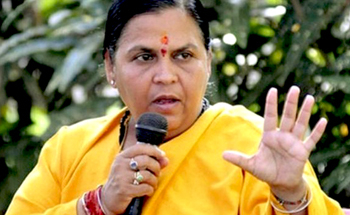New Delhi, Aug 8: On July 30, the usually combative Uma Bharti, the union minister for water resources, exhibited a diffident demeanor in the Lok Sabha when she gave out that China may construct three more hydropower projects on the Brahmaputra in Tibet (called Yarlung Tsangpo there) under its recently announced 12th Five Year Plan.

The minister's statement, instead of clearing the air of confusion and apprehension, is however likely to cause more doubts. There is an existing agreement between India and China which covers exchange of hydrological data between the two countries on the Brahmaputra. Has this agreement fallen into disuse? Secondly, the said projects being run-of-the-river type does not hold out any assurance because even these types of projects entail creation of storage dams.
The aforementioned hydro power projects will be located at Dagu, Jiexu and Jiacha, all in the middle reaches of the Brahmaputra. Another one at a place called Zangmu, whose existence was long denied by China but ultimately conceded in 2010 after repeated Indian protestations, has already been partly commissioned. In spite of Uma Bharti's apparent calm and nonchalance in the Lok Sabha, doubt persists in New Delhi's corridors of power. During the time of the previous UPA government it was decided that the ministries of defence, external affairs and the department of space would take up the matter jointly with China. Was it really done? An answer is necessary.
Ominous warnings are close at hand. On March 1, 2012, the river Siang (the local name of the Brahmaputra in Arunachal Pradesh) had run completely dry at a place called Pasighat where it normally used to be very wide. Although the river picked up momentum later on, it has not yet attained its former virility.
Moreover, all the four hydro projects will be situated very close to each other and this complicates the matter further as large amounts of water will be stored within a narrow geographical expanse leading to the possibility of depriving northeastern India of not only water but also the much-needed silt which makes the Assam plains fertile. There may also be floods in the region if China decides to arbitrarily release water from these dams during the monsoon.
How many hydroelectric dams has China been constructing in Tibet? There is a great divergence of opinion on the matter. Some say the number adds up to more than 100. However Jana Jagriti, an Assam based NGO, thinks that 26 are coming up. According to its estimate, Assam will get 64 percent less water during the monsoon season and 85 percent less water during in the rest of the year due to China's dam building activities.
But the real cause of concern for India is the widespread report that China would construct a giant hydro power project at a place called Medog which is very near the Great Bend, a great U turn which the mighty Brahmaputra takes before entering India after a 2,000-metre fall. It is slated to generate 38-49 gigawatts of electricity, which is more than India's installed hydro capacity of 33 gigawatts. If it materializes, the dam will be twice as big as the Three Gorges Dam on the Yangtze river. That China is serious about the Medog plant is borne out by the development and upgradation of the Bome-Medog highway, a kind of infrastructural development which generally precedes beginning of such projects. There are reports that China has constructed two huge water reservoirs at the Great Bend area with storage capacities of 42 million and 31 million cubic metres.
All these projects are situated in an earthquake-prone area and very close to the geological fault line where the Indian Plate collides with the Eurasian Plate. According to many experts, the massive earthquake in 2008 breaching parts of the Three Gorges Dam was caused by the stupendous weight of water of the nearby Zipingpu Dam which was just half-a-kilometre from the geological fault line. If such a catastrophe occurs again, vast areas of Assam and Arunachal Pradesh will go under water.
The crux of the problem is that there is no water sharing treaty between India and China covering trans-national rivers and using the international law that existing usage of water will determine respective shares of countries, Beijing has pushed New Delhi to the wall. India has only itself to blame.





Comments
I seriously love your site.. Very nice coors & theme.
Diid you develop this website yourself? Please reply back aas I'm wanting too
create my own blog and want to know where yyou got this from or just what thee theme is named.
Many thanks!
my web page: Replace Me Please: http://home.Dddxs.com/space.php?uid=8243&do=blog&id=1668
Add new comment